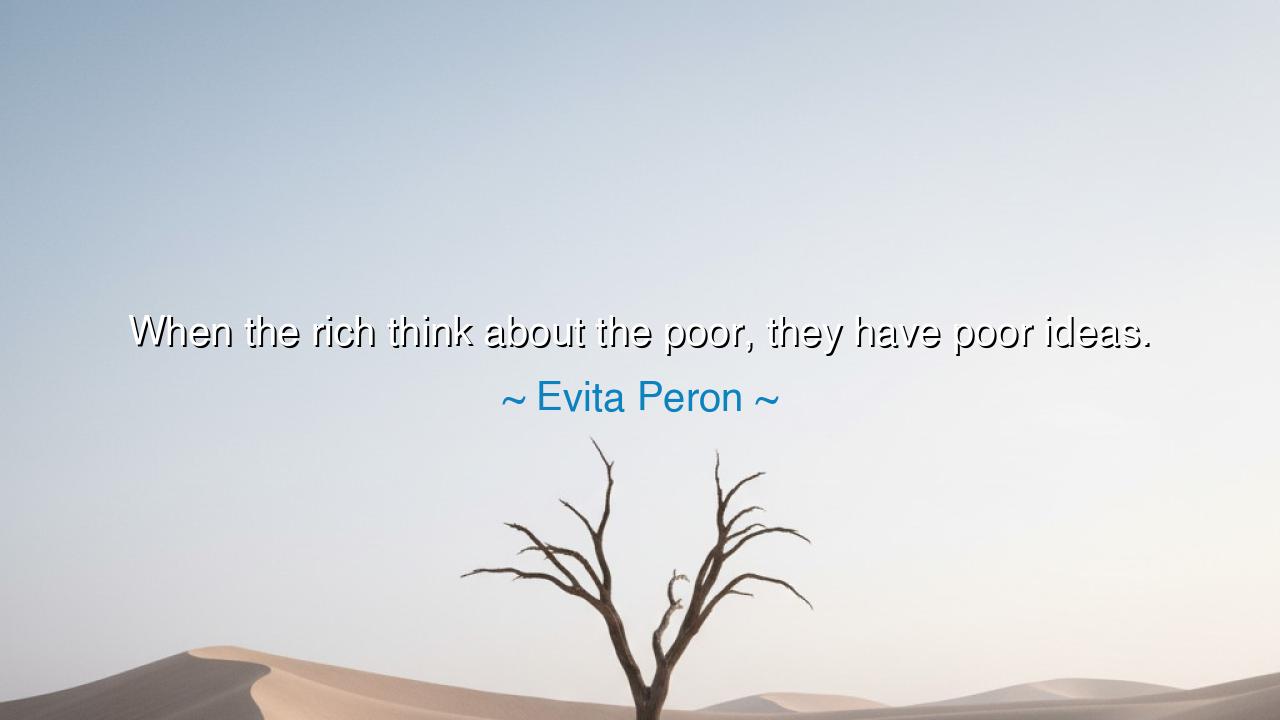
When the rich think about the poor, they have poor ideas.






“When the rich think about the poor, they have poor ideas.” — Evita Perón
In the turbulent heart of the twentieth century, amid the cries of the forgotten and the splendor of the powerful, there rose a voice—Evita Perón, the First Lady of Argentina, a woman born not among the gilded halls of wealth but from the dust of the humble. She knew the taste of hunger, the loneliness of the powerless, and the indifference of those who held the world’s gold. When she declared, “When the rich think about the poor, they have poor ideas,” she was not speaking in bitterness but in revelation—for she had seen how distance dulls compassion and how comfort blinds the heart to the truth of suffering.
In her time, Evita watched as the wealthy elite made plans for the “betterment” of the poor—policies drawn in parlors, discussions held over wine and marble tables. Yet their ideas were poor, for they lacked understanding. They offered charity without empathy, structure without soul. They sought to manage the poor as one manages a field—forgetting that every worker, every mother, every child carries within them the same divine spark. To Evita, poverty was not a stain to be cleansed by pity, but a wound that could only be healed by justice and solidarity.
Her words call us to remember that true compassion cannot be imagined from a throne. It must be lived, touched, and felt in the pulse of real lives. The rich, surrounded by walls of privilege, too often see the poor not as equals but as problems to be solved—numbers, not names; mouths, not voices. Thus, their “ideas” are poor, not for lack of intellect, but for lack of connection. For wisdom does not spring from comfort; it grows in the soil of shared struggle.
History gives us many mirrors of this truth. Think of Marie Antoinette, who, when told the people had no bread, is said to have replied, “Let them eat cake.” Whether the tale is true or not, the meaning endures: the distance between wealth and want breeds blindness. When the privileged cannot see the humanity of the suffering, their solutions become insults. But contrast this with the lives of those who walked among the people—Mahatma Gandhi, who clothed himself as the poor did, and Mother Teresa, who shared their hunger and their tears. They did not think about the poor; they thought with them. And that is the difference between pity and love.
Evita herself lived this truth. She did not remain in the palaces of Buenos Aires, content to speak of reform; she walked among the workers, the descamisados—the “shirtless ones.” She built hospitals, schools, and homes not as gifts of the powerful to the powerless, but as acts of dignity between equals. To the poor, she said, “I will come to you, not as a benefactor, but as your sister.” And so she became their voice, their light, their hope incarnate. Her quote, then, is not merely a criticism—it is a challenge. It calls the privileged to humility, to descend from their towers and see the world through human eyes again.
The lesson, timeless and fierce, is this: wealth without empathy is poverty of the soul. If you hold power, let your thoughts not dwell on what the poor lack, but on what you have forgotten—the courage, resilience, and nobility that flourish even in struggle. Before you speak of solutions, listen. Before you offer aid, understand. The poor do not need your charity; they need your respect and your partnership.
And to all who hear these words, remember: we are measured not by what we build for ourselves, but by what we build together. Tear down the walls of indifference that divide the fortunate from the forgotten. Step into the dust, the streets, the realness of human life. Think not about others, but with them. For in that shared heartbeat lies the true richness of being—the wisdom Evita Perón gave to the world when she reminded us that the only poor ideas are those born without love.






AAdministratorAdministrator
Welcome, honored guests. Please leave a comment, we will respond soon